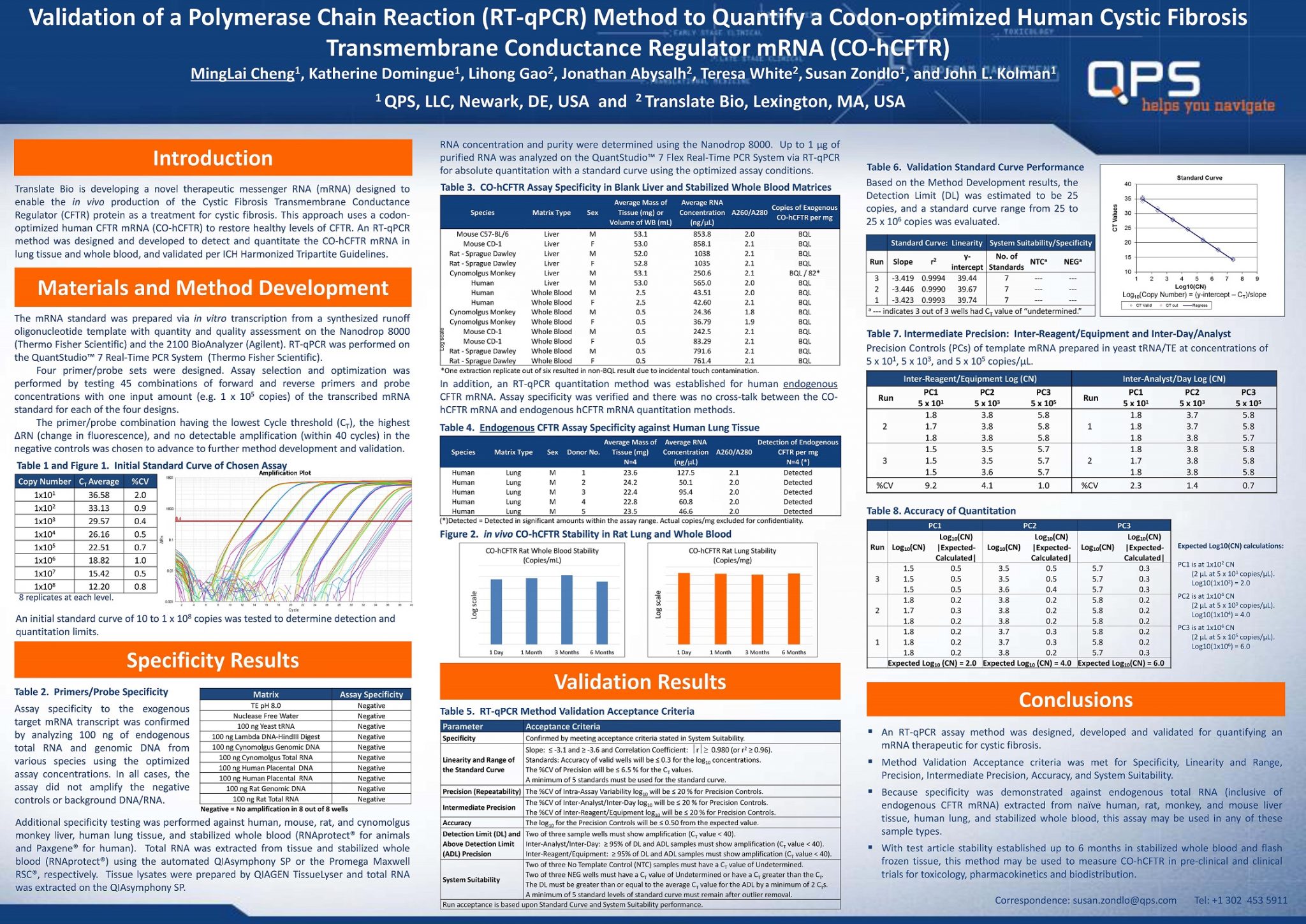Validation of a Polymerase Chain Reaction (RT-qPCR) Method to Quantify a Codon-optimized Human Cystic Fibrosis Transmembrane Conductance RegulatormRNA (CO-hCFTR)

Susan Zondlo, Director of Bioanalysis at QPS, LLC (DE, USA)
Susan Zondlo joined QPS, LLC (DE, USA) in 2008 and is currently serving as a Director of Bioanalysis in the Department of Translational Medicine. In this position, Susan serves as Manager of teams for gene and sequence analysis, protein LC–MS/MS and biomarkers. Prior to joining QPS, Susan held senior research scientist positions at Millennium Pharmaceuticals (MA, USA), Bristol-Myers Squibb (NJ, USA), and the University of Delaware (DE, USA), where she also served as an Adjunct Professor in the Department of Chemistry and Biochemistry. Susan received her BA in biology from Rice University (TX, USA) and her PhD in molecular, cellular and developmental biology from Yale University (CT, USA).
1. Please can you explain about your role at QPS?
I am a Director of Bioanalysis within the Translational Medicine Department at QPS, LLC, which is a Contract Research Organization (CRO). As such, I interact with various sponsors to understand their pre-clinical and clinical study needs and coordinate with our internal Team Leads and PIs to develop assays, trouble-shoot methods, and successfully execute sample analysis studies.
2. How does it feel to win the 12th WRIB Poster Award?
I’m very grateful to the organizers of this year’s WRIB meeting and I’m especially proud to be part of the team that generated the data for the poster. MingLai Cheng, co-author and Team Lead of the QPS group involved in this work, and I both really appreciated all the feedback we received on the poster work while attending WRIB. Since RT-qPCR methods fall into the ‘emerging technologies’ category of bioanalysis, it is particularly helpful to compare methods and practices with our colleagues within the bioanalytical community.
3. Tell us a little about the work on which the poster was based?
The poster is a good representation of how we design, develop and validate RT-qPCR (and qPCR) methods to quantitate mRNA drugs or other oligonucleotide targets. Our general process includes design of primer and probes for three or more potential assays, which will be tested during method development. In fact, Dr John L. Kolman, another co-author, who is Head of our Translation Medicine department, ‘keeps his hands in’ by designing the assays himself.
The three potential designs are tested using various concentrations of primers, probe and target, and the combination with the most robust response and lack of background detection is then further developed and validated. In the validation of this RT-qPCR method, we demonstrated specificity to the codon-optimized CFTR mRNA drug in the endogenous RNA/DNA background of multiple test species.
Methods to measure the corresponding endogenous versions of CFTR mRNA were also developed for each species and were demonstrated to be specific to the endogenous CFTR mRNA, without any detection of the codon-optimized CFTR mRNA.
4. What were the key conclusions from your research?
We determined that a therapeutic codon-optimized mRNA could be specifically quantitated down to 25 copies within the endogenous background of naïve mouse, rat, monkey or human RNA extracted from whole blood or various tissues. For validation of this RT-qPCR method, we relied upon the ICH Q2(R1) Guidelines for establishing appropriate tests and acceptance criteria. We were also able to demonstrate stability in rat whole blood and rat lung tissue in animals dosed with the mRNA drug over a 6 month period.
5. What are you looking forward to working on over the next year?
I’m very interested in being part of the discussions as we move forward to establish industry standards and guidelines for method validations for mRNA, siRNA, aptamer and other oligonucleotide-based drugs. It is a very exciting time for the industry due to the emergence of so many different types of drug molecules and strategies for treatment that are in development.







